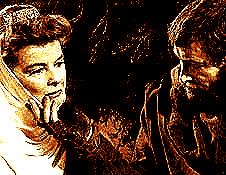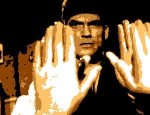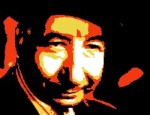Film Review
With its authentic visuals, meticulously crafted screenplay and
mesmeric performances,
The Lion in
Winter is among the best of the spate of lavish historical
dramas that assailed cinema audiences in the 1960s.
Based on a successful Broadway play by James Goldman, the film recounts an
entirely fictitious story of Medieval family strife and intrigue that
challenges the assertion that the dysfunctional family is a product of the
20th Century.
The plot may be a work of fiction, but the characters are closely
modelled on what is known of their historical counterparts, and the
story is plausible, if not
factually accurate. If nothing else, the film serves as
a gentle introduction to one of the most fascinating periods in English
history. If you enjoy this film, the likelihood is you'll soon be
nipping off to the library or going on-line to find out more about
Henry, his dragon of a wife, and their three conniving little brats
(two of whom ended up ruling England, admittedly not very well).
One of the delights of this film is that it doesn't take itself too
seriously. Although the script has a considered, literary quality
and the characterisation is as true to life as you could expect of any
great historical drama, there is an undercurrent of sly humour which
runs throughout the piece. When Henry goes off to slice up his
three grown-up sons, Queen Eleanor sighs, "Well,
every family has their ups and downs". The Plantagenets were just
like any other household, really.
The Lion in Winter was the
second film to be directed by Anthony Harvey, who had previously worked
as a film editor, most notably on Stanley Kubrick's
Lolita (1962) and
Dr Strangelove (1964).
Harvey, assisted by his equally talented cinematographer, Douglas Slocombe,
combines the classical approach for the period drama (unfussy
camerawork which favours the actors and the dialogue) with the
occasional stylistic flourish (such as some inspired crane shots and
camera movements) to remind us of the historical context and pep up the
drama.
Although the film stands up well in all other departments, it is the
acting above all else that makes it a superlative piece of
drama. Although just 36 when he made the film, Peter
O'Toole is convincing as the 50-year-old Henry and plays the monarch as
a flawed tyrant, terrifyingly villainous one minute, dripping with
pathos the next.
It is worth noting that O'Toole had previously played a younger Henry II
just four years previously,
in Peter Glenville's highly acclaimed
Becket (1964).
Katharine Hepburn is an inspired choice for the
role of the shrewd Eleanor of Aquitaine, another highly complex
character which the actress invests with extraordinary vitality and
humanity. The part won Hepburn her third Best Actress Oscar (the
previous year she had won the same award for her performance in
Guess Who's Coming to Dinner
(1967)). Timothy Dalton (the future James Bond) makes an
impressive film debut as the King of France, as smooth and slimy a
villain as you can imagine, whilst Anthony Hopkins proves his mettle in
what was only his second film role.
The Lion in Winter is
classic period drama at its most compelling. A
magnificent screenplay and fautless performances bring to life a period
of English history that, judging by this film, was far more colourful
than the dry paragraphs
in those old school textbooks led us to believe. If the
real Eleanor of Aquitaine was anything like Katharine Hepburn's
depiction of her then history is the ultimate soap opera.
© James Travers 2009
The above content is owned by frenchfilms.org and must not be copied.
Film Synopsis
Christmas, 1183. King Henry II of England summons his estranged
wife Queen Eleanor of Aquitaine and their three sons, Richard, John and
Geoffrey, to Chinon Castle to resolve the matter of his
inheritance. Henry favours his youngest son John, the only one of
his offspring that he loves, but Eleanor is determined that Richard
should inherit the royal crown. When John conspires with Geoffrey
and King Phillip II of France to start a war against England, Henry is
incensed and decides to disinherit all of his sons. He plans to
have his marriage to Eleanor annulled so that he may marry his
mistress, Alais, in the hope that she will bear him more suitable
heirs. Alais convinces Henry that whilst his other sons live, her
children risk being murdered by them. The King has but one option
- to butcher his own sons...
© James Travers
The above content is owned by frenchfilms.org and must not be copied.



